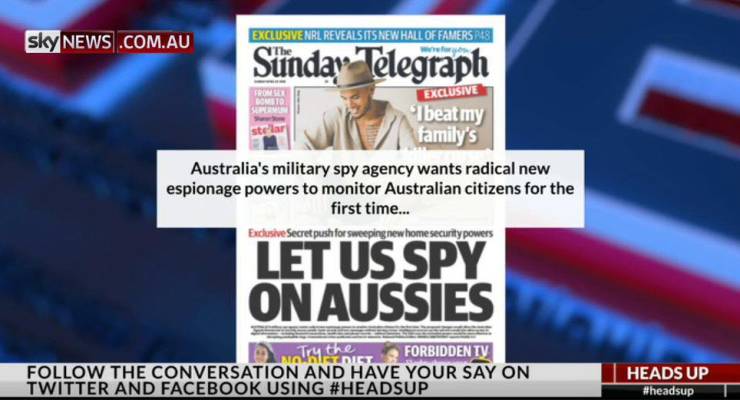
Oh you’d forgotten we live in a police state? One where the government has extraordinary and wide-ranging powers to surveil you, interfere with your life and jail you, all in secret? Powers used not in the service of the rule of law or for national security, but to protect the government from political embarrassment?
That’s why the Australian Federal Police repeatedly went looking for sources for stories about the Immigration Department’s systematic abuse of offshore detainees at the request of Scott Morrison and his bureaucrats. That’s why NBN Co, with the support of the government, sooled the AFP onto Labor shadow minister Stephen Conroy and his staff during the 2016 election. That’s why the government is prosecuting, using secret documents that even defendants are not allowed to see, Witness K and Bernard Collaery for exposing the crimes committed by ASIS against Timor-Leste by the request of the Howard government.
That’s why News Corp journalist Annika Smethurst was raided yesterday over her 2018 story about plans to increase the powers of the Australian Signals Directorate. It’s why the AFP raided the ABC today over 2017 stories exposing misconduct by Australian soldiers in Afghanistan. Both stories well over a year old. Both raids apparently delayed til after the election.
News Corp is rightly outraged about the Smethurst raid. Yesterday it released a statement saying:
News Corp Australia has expressed the most serious concerns about the willingness of governments to undermine the Australian public’s right to know about important decisions Governments are making that can and will impact ordinary Australian citizens. What’s gone on this morning sends clear and dangerous signals to journalists and newsrooms across Australia. This will chill public interest reporting.
Fine sentiments. Except, News Corp has been the single biggest advocate for the radical expansion of the police state in Australia that has occurred in the last six years under the Coalition. The Australian has repeatedly smeared Edward Snowden, often getting basic facts about him wrong. It attacked the ABC for running a story based on Snowden documents that was clearly in the national interest. And News Corp sat silent when NBN Co had the AFP — accompanied, scandalously, by an NBN staffer — raid Conroy and his staff in 2016, including when they went looking in the basement of Parliament House, with the approval of the Liberal President of the Senate, for emails that had been sent to News Corp’s own journalists by Labor staffers. The only person in News Corp who criticised those appalling raids was Andrew Bolt. As it turned out, the raids were a breach of parliamentary privilege, and the AFP had to hand back every single document it stole. Still, nothing could get in the way of News Corp’s enemy being attacked.
And as Crikey reported last week, News Corp has been conspicuously silent on the prosecution of Witness K and Bernard Collaery, despite The Australian actually breaking the story for which they are being prosecuted.
And if at any point in the expansion of the Coalition’s police state, Labor has dared to allow an inch of difference between it and the government, it has been attacked by News Corp as soft on terrorism. One of those all-too-rare occasions was late last year when the government rushed through its ludicrous, destructive attack on encryption and insisted Labor would have blood on its hands unless it passed it unamended. Did News Corp express any concern about “the willingness of governments to undermine the Australian public’s right to know”? Hardly — it editorialised that Morrison had achieved a “strong win” over Labor, while the government’s favourite cut-and-paster, Simon Benson, ran the ridiculous article “Shorten soft on terrorism”.
If, six years ago, News Corp had decided that rather than pursue its usual agenda of reflexively supporting the Coalition, it would stand up for a free press and protections for journalistic sources, that it would oppose the constant expansion of security agency powers rather than cheering them on, that it would pay at least some lip service to its much-vaunted adoration of freedom from state interference, it is likely that its friends in the Liberal Party would have baulked at their endless attacks on basic rights. It did not.
Now News Corp discovers that, in the event one of its journalists dares to embarrass the government, those radically expanded powers will be turned on it as well. You helped construct this police state. Enjoy it.








These raids are also related to the Coalition, with News’ support of course, abusing the Royal Commission powers to go after their partisan enemies.
Yes, I too noticed the irony of the Coalition’s two biggest cheer-squads-News Corpse & 2GB-being amongst the first news outlets to be hit by this new surge in Fascist Behaviour.
I’m surprised the irony didn’t cause Murdoch’s head to explode.
Irony?
This is on purpose.
This is Dutton saying “Remember who’s in charge in this relationship. Remember who can send the cops to re-arrange your office. You thought I was going to be out of office and it was safe to run the odd story that criticised me in the middle of your fine anti-Labor propaganda? Think again, dogsbody.”
News was first because Dutton is making a point.
Well said Bernard. For News Corps this is a case of “and then they came for me”. Impossible to believe we are back here again so soon after Hitler’s Gestapo and SS.
One of the reasons I subscribe to Crikey is because you call out issues like this – I recall reading your analysis around the government’s surveillance laws last year; it must be simultaneously frustrating and bitterly satisfying to see these laws now play out as you predicted.
Yes, it’s all funny – until Team Murdoch’s in the gun.